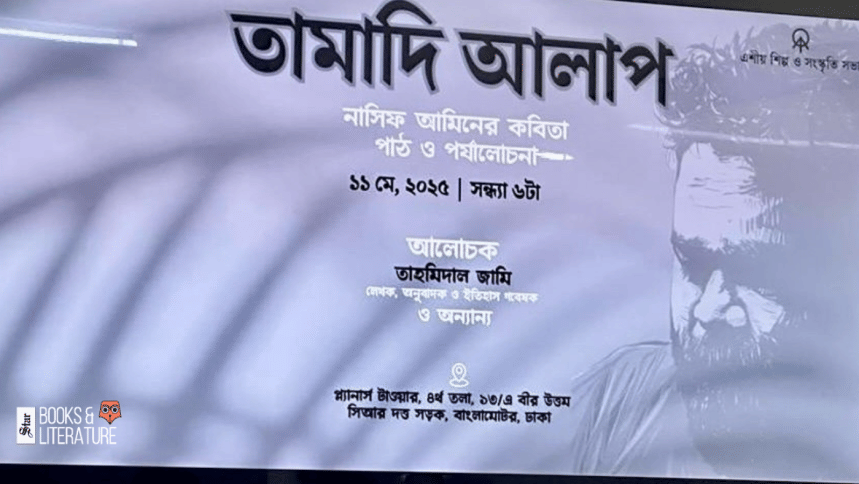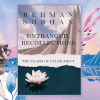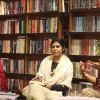‘Tamadi Alap’: Exploring the space between sound and silence

Has poetry become tamadi (irrelevant)? Is poetry dead? Or can it be dead? From the semantics of poems to the metaphysics of poetry—discussions addressing such questions took place in "Tamadi Alap", a poetry reading and discussion session on writer and poet Naseef Faruque Amin's poetry collection, Tamadi (Boitoroni, 2025). Jointly arranged by Ahmad Sofa Rashtroshobha and Centre for Asian Arts and Culture (CAAC), on May 11 at Planners Tower in the Banglamotor area of the capital, chief participants of the panel were the poet Naseef Amin, the writer and researcher Tahmidal Zami, and Professor Salimullah Khan.
The discussion was initiated with a short introduction of the poet by Tahmidal Zami, followed by a recitation of some of his poems by Amin, including "Onortho", "Kotipoy Shironamhin Shunnota", "Jama Bebshaye", "Motadorsher Daga", among others. The writer began with the confession that he was obsessed with words and language since childhood, and how words played and interacted with themselves. This never-ending fascination with words, their changing meanings, and their semantics was what led him to poetry.
The stage was then set for the first discussion by Zami—it was infused with the personal experiences he had with the poet and his poetry, and his rigorous literary analysis. He, too, read out some of the poems from the phase he identifies as the "anti-lyric poetry phase" of the poet. The poems contained satirical undertones, often mixed with vulgar expressions to critique the political and social establishment of his time, which he felt included the petty bourgeoisie, the intellectuals who didn't dare question power, and the ever-cautious urban middle class. Zami then descended into a much more detailed history of lyric and anti-lyric poetry as discussed by Walter Benjamin and other theorists.
In the next part of the discussion, Zami discussed what he sees as the "lyric poetry phase" of the poet. Here, he saw a form of nostalgia for childhood, a form of love for childhood which recurs quite a few times, especially when talking about love and death. But the chief concern of the lyric poetry phase, he identified, was the poet's exploration of the phenomenon of how language fails. For Zami, this was the fundamental contradiction which the poet was trying to overcome—his unending love for words, but at the same time, the realisation that words cannot fully comprehend human existence.
Finally, Professor Salimullah Khan took the stage to initiate discussion. He posited that the poet, to be remembered, needs to transcend that boundary between personal and collective. He gave an example of Baudelaire, who expressed the collective experiences of the modern urban life of 19th century Paris through his personal experience documented in poetry—the rush, the alienation, and the breakdown of interpersonal relationships between strangers. He praised Amin for this particular reason: his poetry surpassed the personal experiences of his suffering in maintaining the work-life balance and became a collective manifesto for everyone living the modern 21st-century urban life.
Khan finished his discussion with a short answer to the question at the beginning: Can poetry die? His answer: "Never." As long as there is language, he said, poetry would prevail. Through this bold proclamation, the event came to an end.
Sadman Ahmed Siam, as the name suggests, is indeed a sad man. Send him happy quotes at: [email protected].

 For all latest news, follow The Daily Star's Google News channel.
For all latest news, follow The Daily Star's Google News channel. 








Comments